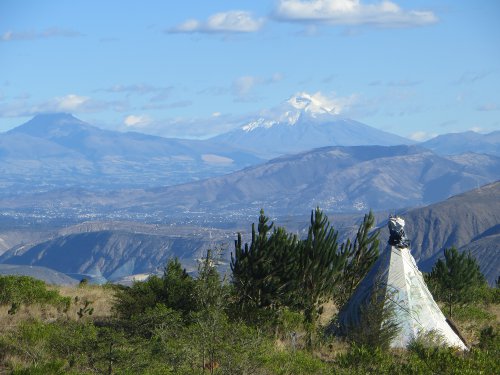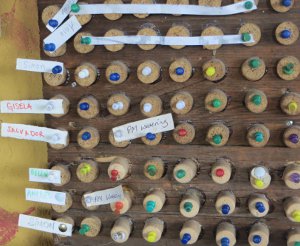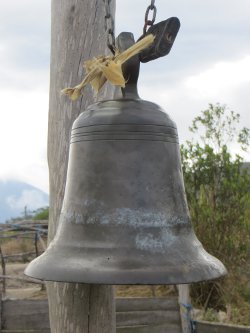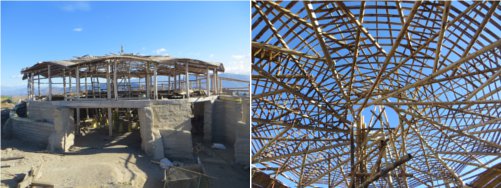Volunteering at Rhiannon Community in Malchingui

We volunteered from July 15 to July 29, 2015 at a community founded about 7 years ago by Helen and Nicky, a British couple. Rhiannon Community is located just one hour and a half from Quito. We got to live in a vegetarian and environmental friendly setting where most waste is reused for planting or feeding the animals to create a balanced cycle of life. This community functions with solar energy and the strength of volunteers from all over the world, who many times come for just a few weeks but end staying months. In Rhiannon, we participated in daily tasks of watering and fertilizing the gardens, feeding the donkeys and chickens, collecting the animal feces and human urine for making compost and bokashi, turning the compost and bokashi, working in super adobe construction projects, baking bread for selling at the Sunday farmer’s markets, and cooking breakfast, lunch, or dinner depending on the schedule.
We were very impressed by the color coding schedule of the activities assigned to each member in the community, a great calendar of cork boards and pins where your name and your chore for the day are visible. There were many things we liked about this community: the compost toilets with a division for collecting urine and feces separately; the solar heater system that allowed us to have warm showers when the sun came out; the spectacular 360 degree view of mountains and volcanoes surrounding the property; and the adobe house and Mongolian style yurt where we spent pleasant nights with the sound of the rain in the background.



The working time at Rhiannon was well structured and the shifts were marked by the sound of a bell. Every person works five consecutive days and then has two days off. The first bell rings at 7am to announce that breakfast has been served and encourage everyone on a working day to get out of bed. At 7:50am the bell rings again to gather all volunteers and permanent community members in the kitchen to assign the tasks of the day. At 11am, the bell announces a break of 30 minutes. At 11:30am, the bell welcomes community members back to work. By 2pm, the bell marks the end of the working day. For volunteers assigned to cook breakfast, their day begins at about 6am, for those assigned to make lunch, they are expected to start cooking by noon and have lunch ready at around 2:30pm. For volunteers assigned to cook dinner, they are expected to start cooking by 5pm and to have dinner ready around 7pm.
Every day one member of the community is responsible for lighting the fire in the kitchen and living room, and to keep it going while lunch and dinner are being prepared. All volunteers are asked to pay a minimum monthly donation of $35 USD or more to stay in the community. Volunteers must commit to a minimum of a 15-day stay. Many things stand out in our memory from our days in this community.
We loved picking and eating wild uvillas (yellow, small tomato-like fruit that grows inside a flower cocoon) and learned a delicious chili recipe with them that we hope to replicate one day. Cooking and eating vegan or vegetarian dishes during our entire stay confirmed once again how tasty and easy it can be to suppress meat and animal products from our diet. This has been a non-stop lesson from our travels around the world that we hope to put in practice whenever we settle back into a daily routine.


At the community we had fun playing and eating chifles (plantain chips) with guacamole with Luna and Satya, two 3-year-old girls living and growing up in the community. Gisela really enjoyed cooking and baking, especially when she was asked to help Kelly to make cinnamon rolls, sweet, and salty breads to sell at the Sunday farmer’s market. With the money collected from this sell, the fruits and vegetables for the weekly meals in the community were purchased.
Sal was very interested in the bio-construction projects. He was eager to learn the techniques used to build with super adobe as well as to help out with his knowledge and experience as a structural engineer. We both helped making adobe and covering walls with it, mixing soil, filling up big bags, and building walls. It was nice to finally be part of a bio-construction project in the process and to admire the finished structures in the property.

We loved the artistic touch and designs of the existing adobe shelters in Rhiannon. In our free times, Sal had fun playing backgammon tournaments with Simon from Poland, and Simon and Julio from France. Gisela enjoyed chatting and laughing with Anabel and Belen from Argentina, and devoured novels non-stop, finishing about 3 books during our stay. After dinner, we both enjoyed talking and laughing with other volunteers. Every day at night the bright look of Quito, so close and yet so far, reminded us that we were living in a place where a different world was possible.
While we were in the community we met several people from different countries, in which the experience of working in teams was both a rewarding and challenging experience. At some point during our days there, we were 24 adults in the property. Living and sharing the same space and responsibilities with all the different people with our very own desires, values, priorities, and needs can be of course difficult. But it was as well a great exercise to put ourselves out of our comfort zone and in a position where we needed to be more flexible and understanding. We felt we grew by recognizing our own challenges to accept other people’s characters and behaviors. We became more aware of our way of being, our preference to do things well, to be productive, and to be committed. Not seeing the same working style in other members frustrated us at times, it was only until we accepted that our way of doing things was not the only one, that we were able to become more tolerant and less frustrated. We ended having a great time with other volunteers from Argentina, Bolivia, Ecuador, Poland, France, UK, Estonia, US, and Canada. Unfortunately at the end, our stay was shortened by an inevitable conflict we do not regret. Although we managed to be more flexible and acceptant of other adult’s differences and their working style, we did not tolerate or passed a blind eye to the well-being of a child. Gisela witnessed how an adult screamed twice at Luna, without reason, while Luna’s mother was not around and she decided to tell the mother. The adult was very angry at Gisela for disclosing this to Luna’s mother and without acknowledging that screaming to a 3-year-old was wrong, the adult asked us to leave her house. It was clear at that point that when things come down to power, Rhiannon was no longer a community. We left with our heads up and our conscious clean, knowing Gisela had acted in the best interest of the little girl and in concordance with what is ethical. Even knowing that protecting a child’s well-being will cause our expulsion from Rhiannon or any other community on earth, we will do it again without hesitation. A month after we were kicked out, Gisela received a kind apology email from the adult that asked us to leave, in which the adult recognized the wrong actions and asked us to remember Rhiannon for the good experiences we did have. It was a nice surprise and a good closing for us.
Regardless of the sour taste left by the way our volunteering experience ended at Rhiannon, we will continue focusing on the positive memories we treasured from our days there and the good friends we made. We were left inspired by the existence of places where humans from all over the world can gather to work and grow together, and attempt to live in harmony with the environment regardless of our differences.
